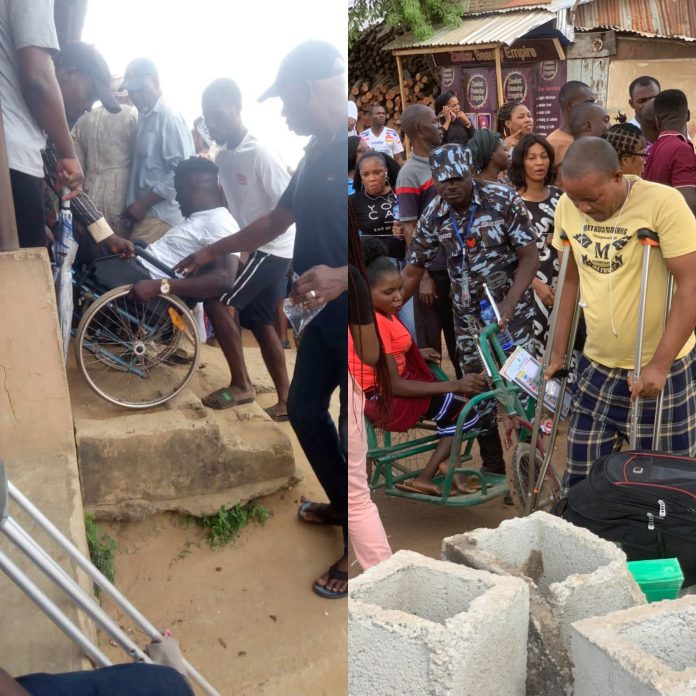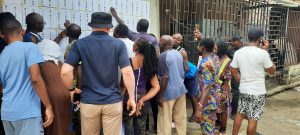By: Blessing Oladunjoye
The just concluded Presidential and National Assembly elections in Nigeria witnessed the active participation of Persons with Disabilities (PWDs) across different parts of the country, who took turns casting their votes for their preferred candidates.
While INEC had announced that it made sufficient provisions for PWDs to participate in the electoral process, many PWDs shared that they encountered challenges either in accessing the polling units (Pus) or getting assistive devices to support their participation in the process.
On the other hand, PWDs identified that they were given priority access at their Pus, which prevented them from waiting in the queue for several hours before being attended to.
Assistive Devices/Provisions for PWDs
To enhance the smooth participation and ameliorate the challenges of PWDs in polling units, the Electoral Act 2022 provides that the Electoral umpire would make reasonable accommodations for PWDs to ensure they participate in the process on an equal basis with others.
S 54 (2) of the Electoral Act 2022 reads that “The Commission shall take reasonable steps to ensure that persons with disabilities, special needs, and vulnerable persons are assisted at the polling place by the provision of suitable means of communication, such as Braille, large embossed print, electronic devices, sign language interpretation, or off-site voting in appropriate cases.”
The assistive devices that PWDs need are; braille ballot guides for Blind persons, posters for Deaf persons, Magnifying glasses for persons with Albinism or low vision, and accessible environments for persons with physical disabilities.
However, INEC deployed 21,165 magnifying glasses; 8,117 braille ballot guides; and 6167 EC30E PWD to 32,889 Polling Units with PWDs.
Experience Sharing: Challenges
Tolani Ojuri, a person with Albinism and the Chairman of the Lagos State Chapter of the Albinism Association of Nigeria (AAN) who voted at PU 017, Kadiri, Iako-Ijaiye, Lagos shared how the unavailability of magnifying glasses at his PU made it difficult for him to participate in the election process independently.
Ojuri when he got to his PU was informed that there are no magnifying glasses, and that he is required to come with an aide should he need any form of assistance.
“I went to the polling unit alone because of the information that INEC has made enough provision, so I had to ask someone to help me check my details on the list of accredited voters before I proceeded to the polling booth.
“The prints on the ballot papers were also very tiny, but the logos were legible enough, so, I only needed my ‘emergency aide’ to differentiate the different ballot papers, while I cast my vote,” he narrated.
Ojuri, who was identified as someone who should benefit from priority voting as the elderly, said he spent a long time standing with lots of appeal before he was eventually attended to.
A first-time voter and a youth with a physical disability, @benedayo who shared her voting experience on Twitter, explained that her PU, Gbagyi Dancing Ground, Jahi 1, in FCT-Abuja was inaccessible to PWDs.
@benedayo said she was able to maneuver to the voting cubicle with the support of her friend, without which it would have been extremely difficult for her to vote.
She also noted that there were no provisions for sign language interpreters nor were there ballot braille guides.
“While there was somewhat of an integration of persons with disabilities at the poll (preference), I wouldn’t have been able to maneuver my way around the polling unit without my friend. The structure wasn’t accessible nor was a sign language interpreter/braille available,” she recounted.
Daniel Ubong, the National PRO of the Nigerian Association of the Blind who monitored the election in different LGAs across Akwa Ibom State lamented that there were no assistive devices in all PUs visited by himself and his team.
Ubong also wondered why there were no assistive devices in the PUs even when there were PWDs, as against the statement of INEC that assistive devices have been distributed to polling units across the country.
“There were no braille guides, no magnifying glasses in most of the polling units in Akwa Ibom state and one would wonder what happened to them if these tools have been budgeted for already.
He however commended the turnout of PWDs at the polls which he said was “better than previous elections.”
Experience Sharing: Good Practices
Hon Kiyennan Mizim, a woman with a physical disability who voted in PU 009, Nungwus, Pankfhin LGA in Plateau State shared that the process was seamless in her PU, not just for her but for other PWDs.
Mizim explained that PWDs in her PU were given priority voting access, with the environment fully accessible to persons with disability and the availability of a sign language interpreter for a Deaf voter at the PU.
“I was surprised to see a sign language interpreter in my polling unit, and the Deaf person that was present was able to understand the voting instructions and she voted seamlessly. Apart from her, there were three other persons with physical disabilities in my polling unit, and we were all given priority access.
“The environment was accessible to me, I voted on my own without any assistance,” She added.
Mizin also reckoned that other PWDs that called her after the elections shared that the process was smooth.
The Lagos State Chairman of the Spinal Cord Injuries Association of Nigeria, (SCIAN), Mr Abdulwahab Matepo shared that his polling unit, PU 24 at Ikeja GRA, Lagos was accessible for him as a wheelchair user.
He noted that he was given ‘express service’ and the location of the ballot boxes was accessible.
“Reports from PWDs across the state show that priority was given to PWDs almost everywhere. However, I read that some voters around Kosofe LGA complained about the priority given to PWDs and the elderly,” he buttressed.
Observer Group Reacts
The Campaign for Equal Voting Access for Persons with Disabilities (EVAPWD), a program of the Centre for Citizens with Disabilities (CCD) in a preliminary report about the 2023 Presidential and National Assembly elections recorded a mix of poor and good practices in the polling units monitored by the EVAPWD observers.
The group in a statement signed by David Anyaele, the Chairman of EVAPWD noted that priority voting was given to PWDs in most of the polling units observed and some PUs in Gombe, Plateau, Ebonyi, and Akwa Ibom States.
On the contrary, the group noted that some PWDs could not get assistive devices to vote easily in some PUs.
“EVAPWD observers observed that the deployment of Braille guides, shade, and magnifying glasses were invisible at the PUs visited, as only two Polling Units recorded availability of these items,” it stated.
The group thereafter appealed to INEC to review the “pattern of deployment of assistive devices such as Braille guides, shade, and magnifying glasses so as to achieve the objectives of procuring the materials.”
Credit: BONEWS.COM









